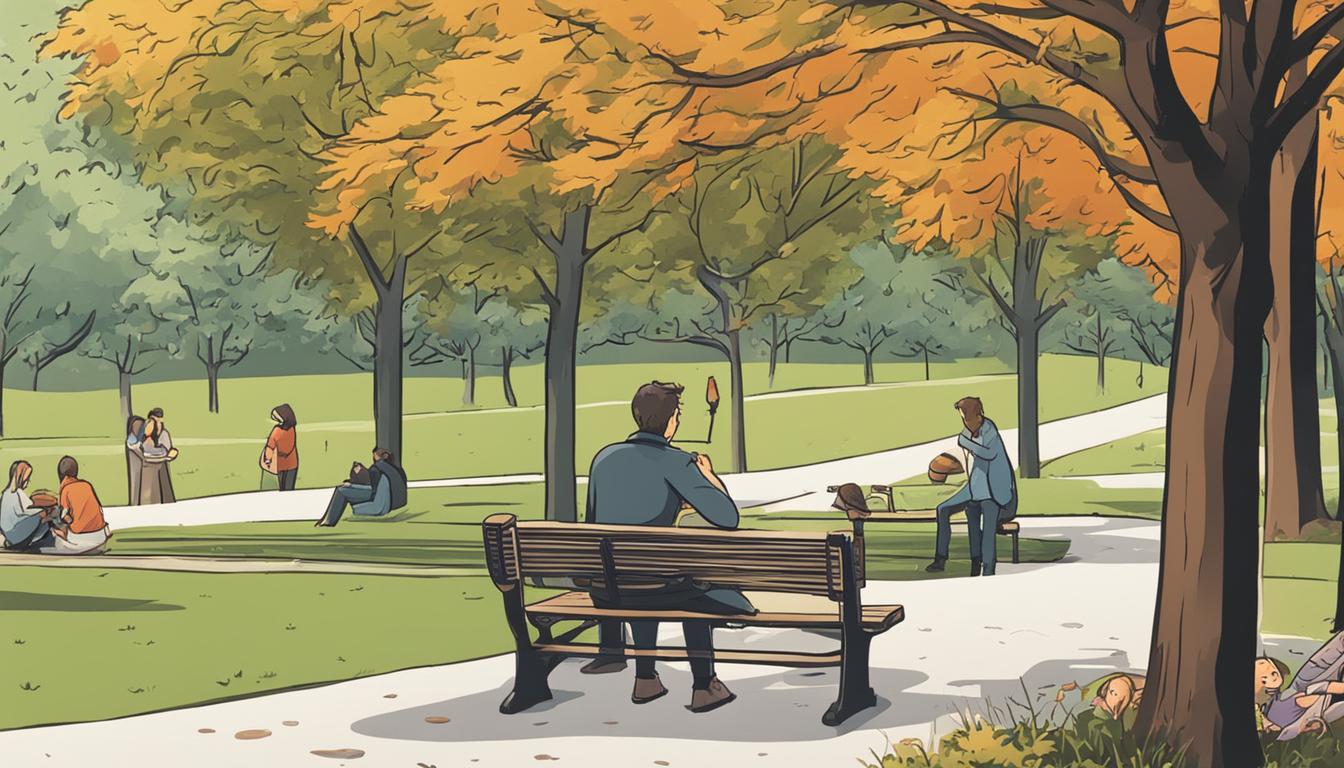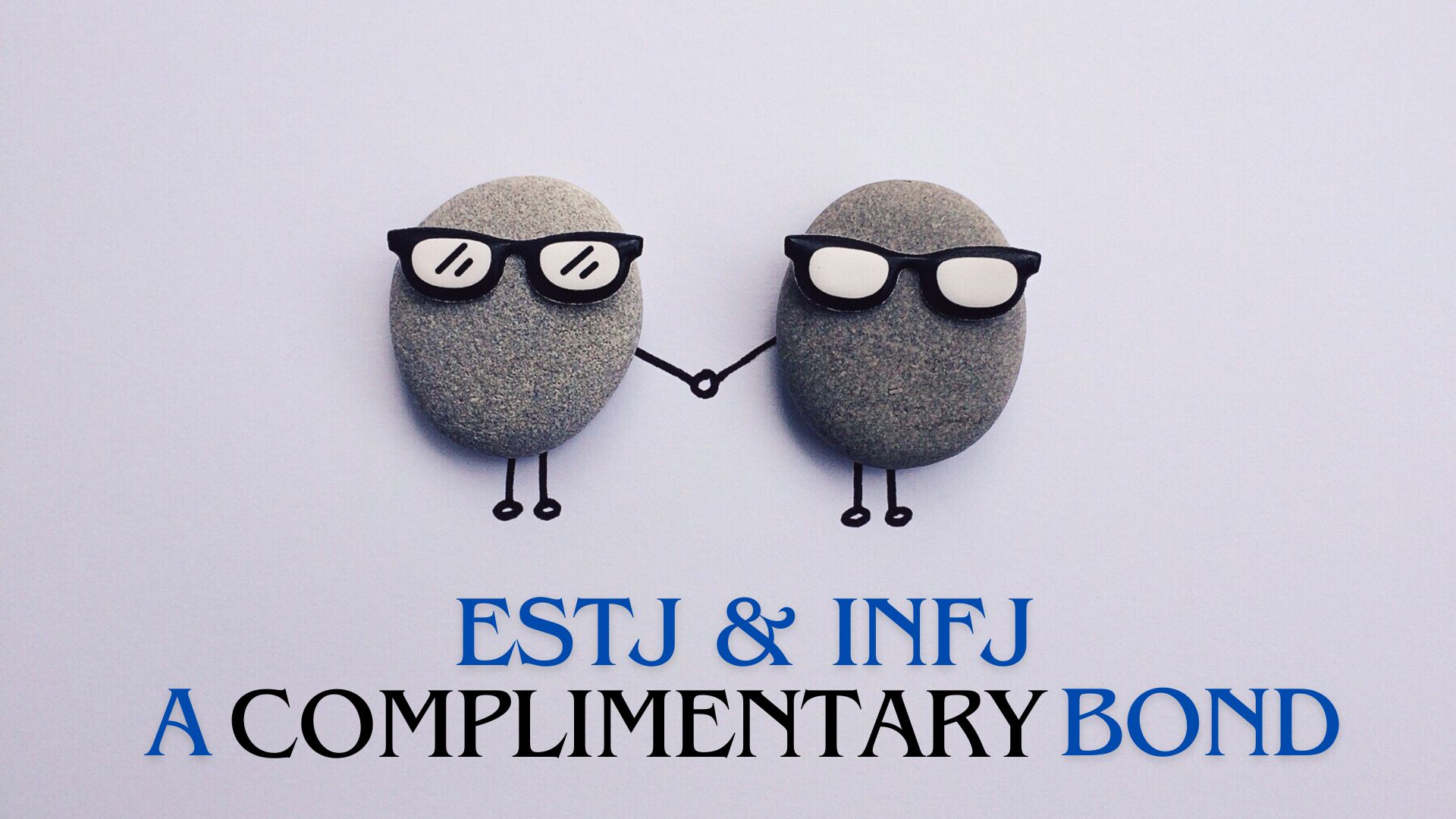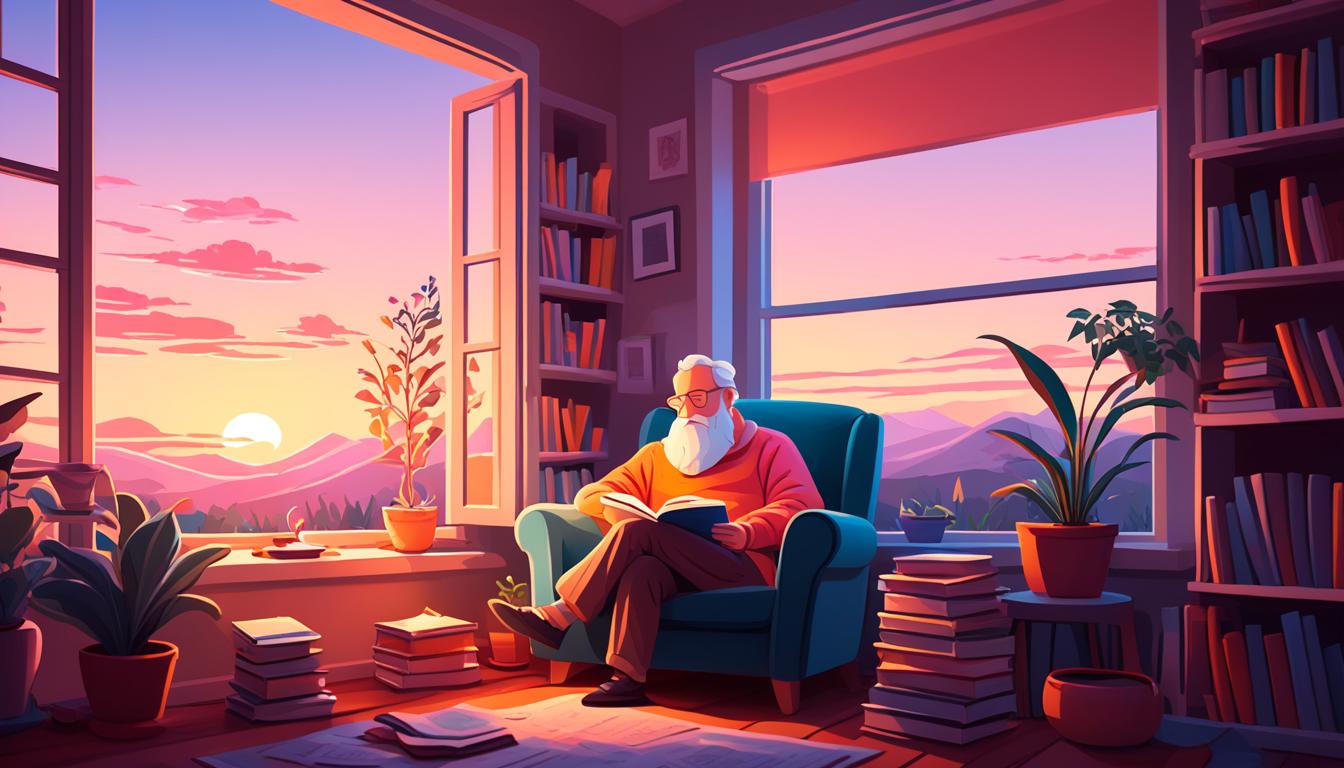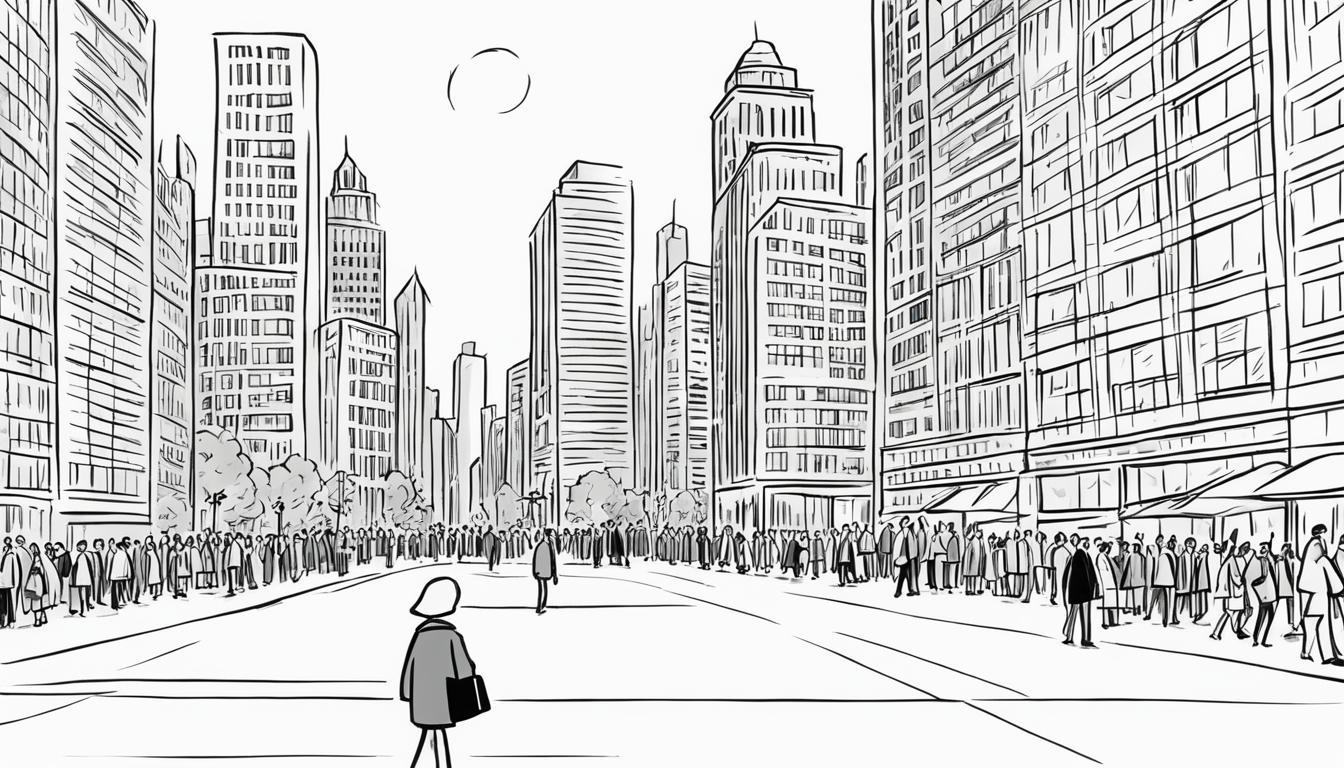As an introvert, socializing can be both exhilarating and exhausting. While spending time with others can be fulfilling, excessive social interaction can have negative effects on introverts’ mental health and energy levels. In this article, we will explore the consequences of introvert socializing and provide tips on how introverts can navigate social situations while preserving their well-being.
Key Takeaways:
- Excessive socialization can lead to introvert burnout, emotional fatigue, and physical exhaustion.
- Introverts may experience increased social anxiety, overstimulation, and energy drain after prolonged socializing.
- Coping strategies, self-care techniques, and recharge methods can help introverts manage social exhaustion and maintain their mental well-being.
- Introverts should find a balance between socialization and solitude to avoid burnout.
- Navigating social events successfully requires introverts to conserve energy, engage in meaningful conversations, and find moments of solitude.
Understanding Introvert Burnout
If you’re an introvert, you know that socializing can be exhausting. While many people thrive on social interactions, introverts can experience burnout as a result of too much socializing. This section will explore the symptoms of introvert burnout, as well as the impact it has on your energy levels and mental well-being.
Introvert burnout symptoms
Introvert burnout can manifest in various ways, including:
- Feeling emotionally drained after socializing
- Experiencing physical fatigue
- Becoming easily overstimulated
- Feeling irritable or moody
- Withdrawing from social situations
Introvert overstimulation signs
As an introvert, you may become easily overstimulated in social situations, leading to exhaustion and burnout. Some signs of overstimulation may include:
- Feeling jittery or restless
- Becoming easily distracted
- Feeling overwhelmed or anxious
- Having trouble concentrating
- Feeling physically or mentally drained
Introvert energy drain
Socializing can drain introverts of their energy, leaving them feeling depleted and exhausted. This energy drain can manifest physically and mentally, making it challenging to engage in social activities for extended periods. It’s important to recognize your limits and take steps to manage your energy levels to avoid burnout.
While socializing can be fulfilling and enjoyable, it’s important to recognize that introverts may experience social exhaustion more quickly than extroverts. This exhaustion can impact their ability to engage in social situations and may lead to burnout or withdrawal. Understanding the effects of socializing on introverts is key to managing your energy and well-being.
Introverts and social exhaustion
Introverts are prone to social exhaustion because socializing requires an enormous amount of energy for them. This exhaustion can impact their overall mental health and well-being, and it’s essential to recognize that it’s okay to say no to social engagements when you need to recharge.
The Impact on Mental Health
Excessive socialization can have a negative impact on your mental health, particularly if you’re an introvert. Increased levels of social anxiety and feelings of overwhelm are common among introverts who frequently engage in social interactions.
To manage these challenges, it’s essential to develop coping strategies and self-care techniques that work for you. Prioritizing alone time and finding ways to recharge after socializing can help you maintain your mental well-being while still participating in social events.
“I find socializing to be draining, but I don’t want to miss out on opportunities to connect with others. By prioritizing self-care and finding ways to recharge, I’m able to strike a balance that works for me.”
Coping Strategies
Coping strategies can help you manage social anxiety and feelings of overwhelm when engaging in social interactions. Some effective coping strategies for introverts include:
- Practicing mindfulness or meditation before socializing
- Setting realistic expectations and boundaries for social events
- Bringing a trusted friend or ally for support
- Taking breaks during social events to recharge
- Engaging in activities that you enjoy, like reading or drawing, to relieve stress
Self-Care Techniques
Self-care is crucial for maintaining your mental well-being, particularly in the face of social exhaustion. Some self-care techniques that you may find helpful include:
- Prioritizing alone time to recharge and regroup
- Engaging in activities that make you feel good, like exercise or spending time in nature
- Practicing relaxation techniques, like deep breathing or taking a warm bath
- Establishing a regular sleep schedule for optimal rest and rejuvenation
Recharge Techniques
Recharge techniques can help you replenish your energy levels after socializing. Some effective recharge techniques for introverts include:
- Spending time alone to decompress and reflect
- Engaging in creative or artistic pursuits that help you unwind
- Listening to soothing music or nature sounds to promote relaxation
- Practicing relaxation techniques, like progressive muscle relaxation or guided imagery
By developing coping strategies, self-care techniques, and recharge methods that work for you, you can maintain your mental well-being while still participating in social events. Remember, it’s okay to prioritize your own needs and preferences when it comes to engaging in social interactions.

The Physical Symptoms of Introvert Exhaustion
Introvert exhaustion not only affects mental health but also manifests in physical symptoms. These symptoms can vary from person to person but may include:
| Physical Symptoms | Effects |
|---|---|
| Headaches or migraines | Disrupts daily routine and productivity |
| Stomach aches or digestive issues | Causes discomfort and may lead to absenteeism from work or school |
| Increased heart rate or elevated blood pressure | Leads to physical strain on the body and may require medical attention |
| Frequent illnesses or infections | Weakens the immune system and may lead to missed work or social engagements |
It’s essential to listen to your body and recognize these physical symptoms as signs of introvert burnout. Ignoring these symptoms may worsen the condition and lead to more severe health problems in the future.
Introvert exhaustion is primarily caused by the energy drain experienced by introverts after prolonged socializing. Therefore, it’s crucial to take the necessary steps to recharge your physical energy levels. This may include taking restorative naps, indulging in physical activity, or eating nourishing, healthy food.
Implementing self-care practices can also help alleviate physical symptoms of introvert exhaustion. Try incorporating activities like yoga, meditation or massage therapy into your routine to manage stress levels and improve overall physical health.
Remember, introvert exhaustion is a real and pressing issue. By recognizing the physical symptoms, taking steps to recharge your physical energy, and practicing self-care, you can successfully navigate social situations without compromising your well-being.
Tips for Managing Social Exhaustion
Social exhaustion is a very real experience for introverts. When socializing, you may feel like your energy is being drained, leaving you feeling mentally and physically exhausted. However, there are ways to manage social exhaustion and make socializing more manageable for you.
Introvert Coping Strategies
One of the most effective ways to manage social exhaustion is to have coping strategies in place to help you recharge. These could include taking breaks during social events, finding a quiet space where you can be alone, or having a trusted friend you can talk to when you’re feeling overwhelmed.
Introvert Self-Care
Self-care is essential for introverts to maintain their well-being. This includes getting enough rest, eating well, and engaging in activities that you enjoy. It’s important to prioritize self-care, even when you’re feeling social pressure to be out and about.
Introvert Recharge Techniques
Everyone recharges differently. Some introverts may enjoy reading in a quiet space, while others may prefer taking a walk in nature. Experiment with different techniques and find what works best for you. Make sure to schedule time for recharging in your daily routine.
Introvert Socializing Tips
When socializing, it’s important to set boundaries and communicate your needs with others. If you’re feeling overwhelmed, it’s okay to take a break or leave early. Additionally, try to find social activities that are meaningful to you and align with your interests.
Social Anxiety
Social anxiety can be a significant challenge for introverts. If you experience social anxiety, it’s essential to seek support from a mental health professional. Additionally, meditation, mindfulness, and deep breathing can be helpful techniques for managing social anxiety in the moment.
Overall, managing social exhaustion requires self-awareness, boundary-setting, and prioritization of self-care practices. By implementing these tips and strategies, you can make socializing less overwhelming and more enjoyable for you.
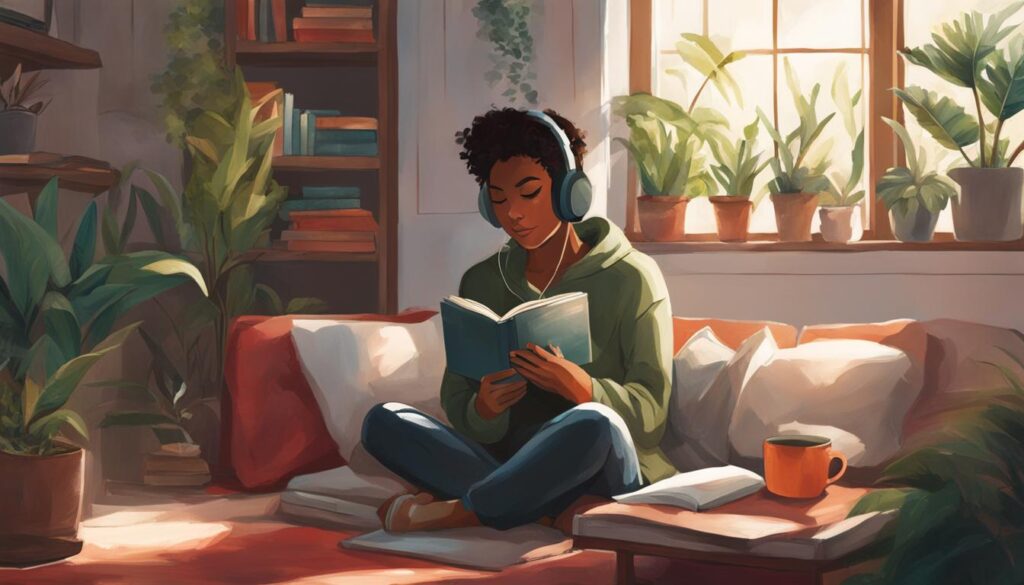
Finding Solitude: The Introvert’s Sanctuary
As an introvert, you need alone time to recharge and maintain your mental well-being. Solitude can serve as your sanctuary, providing the space you need to disconnect from external stimuli and reconnect with yourself.
Introvert self-care and recharge techniques often center around finding moments of solitude. This can include activities such as journaling, meditating, or simply spending time in nature. It’s essential to prioritize these moments in your daily routine to avoid overstimulation and social exhaustion.
One effective way to incorporate solitude into your routine is to create a designated space for yourself. This could be a cozy nook in your home, a quiet corner of your favorite coffee shop, or a spot in nature that speaks to your soul. Having a dedicated space for yourself signals to others that you need time alone and reinforces the importance of solitude in your life.
| Introvert Self-Care Tips for Finding Solitude: |
|---|
| Create a designated space for yourself where you can disconnect from external stimuli and reflect on your thoughts and feelings. |
| Take breaks throughout the day to step away from the hustle and bustle of daily life and give yourself moments of quiet. |
| Set boundaries with others and communicate your need for alone time to avoid overstimulation and burnout. |
Finding moments of solitude can be challenging in a world that prioritizes extroverted traits and social interaction. However, carving out this time and space for yourself is essential for maintaining your mental health and well-being as an introvert.
The Science Behind Introvert Overstimulation
As an introvert, you may find yourself feeling overwhelmed and mentally exhausted after extended periods of socializing. This is due to overstimulation, a common experience for introverts.
While extroverts thrive on external stimulation, introverts process sensory information differently, making them more susceptible to becoming overwhelmed by external stimuli. This overstimulation, in turn, can lead to feelings of exhaustion and emotional fatigue.
Here are some signs of introvert overstimulation:
- Feeling mentally exhausted after socializing
- Difficulty concentrating or processing information
- Feeling irritable or agitated
- Heightened sensitivity to sensory stimuli such as noise, light, or touch
To combat overstimulation, it’s important to practice mindfulness and meditation techniques. These practices can help introverts become more aware of their surroundings and develop better control over how they process external stimuli.
Another effective technique is to take breaks from socializing. This allows introverts to recharge their energy levels and prevent burnout.
By understanding the science behind introvert overstimulation and implementing coping strategies such as mindfulness, meditation, and breaks from socializing, you can manage your energy levels and avoid social exhaustion.

The Role of Introvert Social Anxiety
If you’re an introvert, social anxiety may be a familiar feeling. Social anxiety is the fear of being judged, evaluated, or rejected in social situations, and it can be especially challenging for introverts who already find socializing exhausting.
Introvert social anxiety can have a significant impact on mental health and overall well-being, leading to increased levels of stress and even physical symptoms. It’s crucial to address social anxiety to prevent burnout and exhaustion.
Introvert Coping Strategies
One way to manage introvert social anxiety is through coping strategies. Coping strategies allow introverts to feel more comfortable in social situations and reduce anxiety levels.
- Mindfulness and meditation: Practicing mindfulness and meditation can help introverts stay present and centered in social situations, reducing anxiety and improving well-being.
- Deep breathing exercises: Deep breathing exercises can help introverts relax and reduce anxiety levels, allowing for a more comfortable social experience.
Introverts and Social Exhaustion
Introverts may experience social exhaustion due to the additional stress caused by social anxiety in social situations. This exhaustion can lead to physical symptoms and emotional fatigue.
It’s essential to recognize the signs of social exhaustion to prevent burnout and other negative consequences. Symptoms of social exhaustion may include:
- Feeling physically drained and tired
- Increased heart rate and breathing
- Difficulty concentrating and making decisions
By recognizing these symptoms, introverts can take steps to address social exhaustion and prevent burnout.
Introverts in Social Situations
Finally, it’s essential to remember that social anxiety and social exhaustion are common experiences for introverts. Introverts may find social situations challenging, but that doesn’t mean they can’t be enjoyable.
By practicing introvert coping strategies and recognizing social exhaustion, introverts can navigate social situations with more ease and confidence.
Recognizing and Addressing Introvert Burnout
As an introvert, social exhaustion is a real issue that can lead to burnout. Burnout symptoms can manifest both physically and mentally, such as feeling physically drained, irritable, and cynical.
If you are experiencing these symptoms, it’s important to recognize that you may be experiencing introvert burnout. Ignoring these symptoms can lead to long-term consequences, such as depression and anxiety.
Introvert Coping Strategies
One of the most effective ways to manage introvert burnout is by practicing coping strategies. These strategies could include:
- Taking breaks during social events
- Engaging in calming activities, such as meditation or yoga
- Setting personal boundaries in social situations
- Learning to say no when necessary
By implementing these coping strategies, you can reduce social exhaustion and alleviate burnout symptoms.
Introvert Self-Care
Self-care is essential for introverts to maintain their mental and emotional well-being. Some self-care techniques that can be helpful include:
- Practicing mindfulness and taking time for yourself
- Engaging in hobbies that you enjoy
- Connecting with nature and the outdoors
By prioritizing self-care, you can recharge your energy and reduce the likelihood of experiencing burnout.
Introvert Recharge Techniques
Along with self-care, recharging techniques are crucial for introverts to avoid burnout. Some recharge techniques that you might find helpful include:
- Scheduling alone time to recharge
- Taking a relaxing bath or shower
- Listening to calming music or a guided meditation
By incorporating these recharge techniques into your routine, you can boost your energy and help prevent burnout.
Establishing Healthy Boundaries
It’s important for introverts to establish healthy boundaries in social situations to prevent burnout. This could include:
- Scheduling rest days to avoid over-committing to social events
- Being clear about your limitations and communicating them with others
- Avoiding guilt when saying no to social events
By establishing these boundaries, introverts can reduce the likelihood of burnout and maintain their well-being.
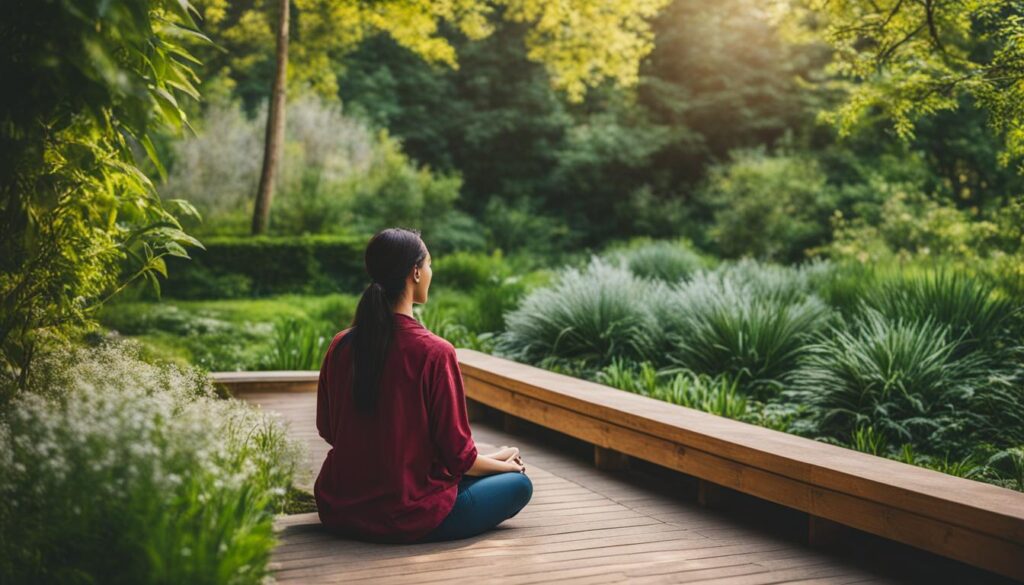
“If your compassion does not include yourself, it is incomplete.” – Jack Kornfield
Recognizing and addressing introvert burnout is essential for maintaining mental and emotional well-being. By practicing coping strategies, prioritizing self-care, recharging techniques, and establishing healthy boundaries, you can prevent burnout and ensure that social exhaustion does not take a toll on your life.
Navigating Social Events as an Introvert
Social events can be daunting for introverts, filled with various triggers for anxiety and exhaustion. However, with the right strategies, you can successfully navigate these situations without succumbing to social burnout or fatigue. Here are some tips to help you manage social events:
Create a Plan
Before attending a social event, take some time to create a plan. Decide on how long you will stay and what you hope to accomplish. This will help you focus your energy and better manage your time.
Find a Safe Space
Introduce yourself to the host and locate a quiet, comfortable space where you can retreat if necessary. This will give you a place to recharge and escape the social pressure of the event.
Engage in Meaningful Conversations
Instead of trying to socialize with everyone, focus on having a few meaningful conversations. This will allow you to conserve your energy while still enjoying the event.
Take Breaks
Take breaks throughout the event to recharge. Step outside for a few minutes or find a quiet corner to sit and take deep breaths.
Don’t Be Afraid to Leave Early
If you feel like you’ve had enough, don’t be afraid to leave early. Your well-being is more important than social expectations.
Remember to Practice Self-Care
After the event, take some time for self-care. Engage in activities that recharge your energy, such as taking a bath or reading a book.
By following these tips, you can successfully navigate social events without feeling overwhelmed or exhausted. Remember to prioritize your well-being and practice self-care, and you’ll be able to enjoy socializing as an introvert.
The Importance of Downtime and Recharge
As an introvert, it’s crucial to prioritize downtime and recharge to avoid social exhaustion and energy drain. Taking time for yourself can help you maintain your mental well-being and allow you to recharge your batteries.
One way to incorporate downtime into your routine is by scheduling it. Set aside specific blocks of time each day or week for activities that you enjoy doing alone, such as reading, meditating, or taking a walk. Make sure to communicate your needs with friends and family so they can respect your downtime and not interrupt you.
Another way to recharge is by engaging in self-care activities. You can take a warm bath, indulge in your favorite food, or listen to calming music. Practicing mindfulness and meditation can also be helpful in reducing stress and anxiety.
When you’re feeling socially exhausted, it’s important to give yourself permission to take a break from socializing. It’s okay to decline invitations or leave events early if you’re feeling overwhelmed. Remember that taking care of yourself is the top priority.
Ultimately, it’s up to you to determine what downtime and recharge activities work best for you. It’s essential to prioritize self-care, as it will help you maintain your mental health and energy levels, and enable you to continue to socialize in a way that feels comfortable and sustainable.
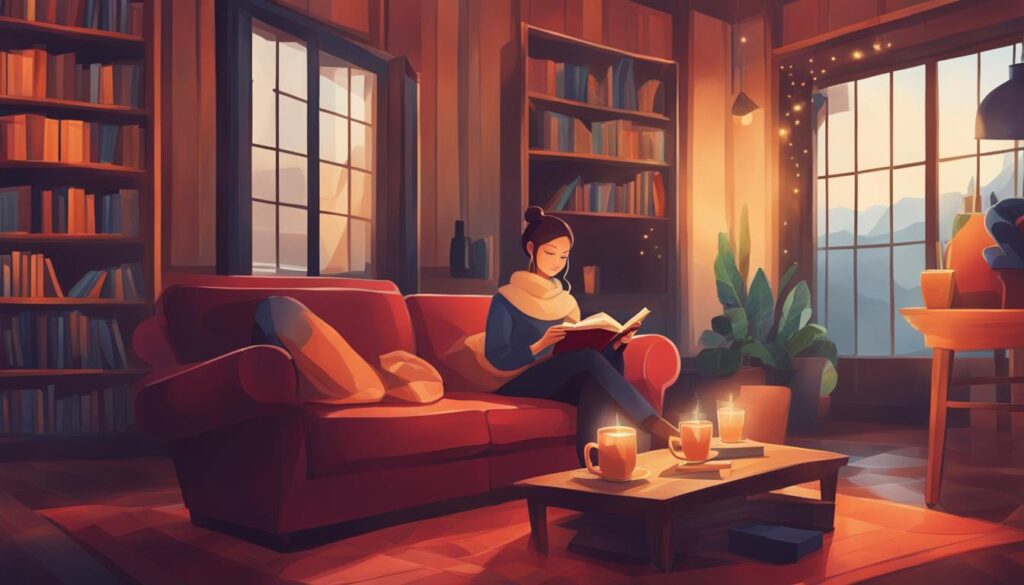 Keyword: downtime, introvert self-care, introvert recharge techniques, introvert social exhaustion, introverts and energy drain from socializing
Keyword: downtime, introvert self-care, introvert recharge techniques, introvert social exhaustion, introverts and energy drain from socializing
Conclusion: Balancing Socialization and Introversion
As an introvert, managing social exhaustion can feel daunting, but there are effective strategies you can use to balance your social life and self-care needs. Throughout this article, we explored various coping strategies, self-care techniques, and recharge methods that introverts can employ to maintain their well-being when socializing.
Remember, social exhaustion is not a sign of weakness. It’s a natural response to overstimulation that can impact your mental and physical health. By recognizing the signs of burnout, prioritizing your self-care, and establishing healthy boundaries, you can manage social exhaustion and enjoy socializing on your terms.
Introvert Coping Strategies
When socializing as an introvert, it’s essential to have coping mechanisms in place to help you preserve your energy and mental well-being. Some effective coping strategies include:
- Scheduling alone time before and after social events to recharge and decompress.
- Practicing mindfulness or meditation to help manage overwhelming thoughts and emotions.
- Engaging in activities that align with your interests and allow you to recharge, such as reading, drawing, or listening to music.
Introvert Self-Care
Self-care is crucial when managing social exhaustion. Prioritizing your self-care routine can help you feel rested, rejuvenated, and ready to tackle social situations. Some self-care techniques that introverts can use include:
- Taking breaks from social media and electronic devices to disconnect and recharge.
- Practicing relaxation techniques, such as taking a warm bath or practicing gentle yoga stretches.
- Getting enough sleep and prioritizing a healthy diet to maintain physical health.
Introvert Recharge Techniques
Recharge techniques provide introverts with an opportunity to restore their energy levels and create a sense of calm and relaxation. Some effective recharge techniques include:
- Taking a nature walk or spending time in a quiet outdoor environment.
- Reading a book or engaging in creative pursuits that allow for solitude and introspection.
- Practicing deep breathing or visualization exercises to increase relaxation and reduce stress.
Remember, everyone has unique needs when it comes to managing social exhaustion. Experiment with different techniques and strategies until you find what works best for you.
The Importance of Social Interaction for Introverts
While social exhaustion can be challenging, social interaction is still essential for introverts to maintain healthy relationships and personal growth. Finding a balance that works for you is key. Some ways that introverts can navigate social situations include:
- Scheduling social events in advance to give yourself time to prepare.
- Setting boundaries with friends and family so that you can prioritize your own needs when socializing.
- Engaging in meaningful conversations that align with your interests and values.
Remember, you don’t have to sacrifice your introverted nature to enjoy social interaction. Finding a balance that feels authentic and energizing is possible with the right strategies and mindset.
FAQ
What are the consequences of excessive socialization for introverts?
Excessive socialization can lead to introvert burnout, causing mental and physical exhaustion, social anxiety, and a drain on energy levels.
What are the symptoms and signs of introvert burnout?
Introvert burnout can result in emotional fatigue, increased social anxiety, and a general feeling of overwhelm and exhaustion.
How does excessive socialization affect introverts’ mental health?
Excessive socialization can exacerbate social anxiety in introverts and negatively impact their overall mental well-being.
What are the physical symptoms of introvert exhaustion?
Introvert exhaustion can manifest in physical symptoms such as fatigue, headaches, muscle tension, and a weakened immune system.
How can introverts manage social exhaustion?
Introverts can manage social exhaustion by practicing self-care, employing recharge techniques, and setting boundaries in social situations.
Why is solitude important for introverts?
Solitude allows introverts to recharge their energy levels and process their thoughts and emotions without external stimulation.
What is the science behind introvert overstimulation?
Introverts are more susceptible to overstimulation due to their heightened sensitivity to external stimuli, and it can lead to social exhaustion.
How does social anxiety impact introverts?
Social anxiety can make socializing more challenging for introverts, increasing their levels of stress and discomfort in social situations.
How can introverts recognize and address burnout?
Introverts can recognize and address burnout by being mindful of their energy levels, practicing self-care, and establishing healthy boundaries.
What strategies can introverts use to navigate social events?
Introverts can navigate social events by conserving energy, engaging in meaningful conversations, and finding moments of solitude to recharge.
Why is downtime and recharge important for introverts?
Downtime and recharge allow introverts to restore their energy levels and maintain their mental well-being.
How can introverts balance socialization and introversion?
Introverts can find balance by practicing self-care, utilizing coping strategies, and honoring their need for alone time while engaging in social interactions.
